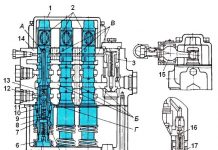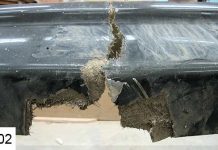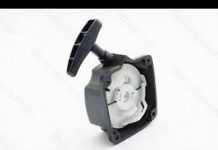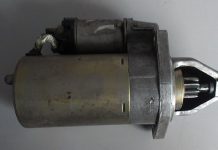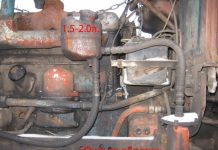In detail: do-it-yourself car air conditioner radiator repair from a real master for the site my.housecope.com.
As practice shows, the breakdown of the air conditioner in the car occurs at the most inopportune moment, when there is no time or money to visit the service. In such cases, there is only one option left - self-repair by identifying a defect and fixing it with your own hands. One of the most common causes of a non-working air conditioner is a faulty radiator, so you need to start looking for probable causes from it. How to repair the radiator of a car air conditioner, you will learn in this article.
The operation of the air conditioner radiator (RC) is to change the state of freon, that is, from gaseous to liquid. Forced circulation occurs in the system, against which the process of heat transfer occurs. The refrigerant circulates through the system using a special pump.
Note! The composition of the RC includes special ultra-thin channels, which are designed to improve the processes of heat transfer and condensation of the refrigerant. As a rule, the heatsink is made of aluminum alloy, although other materials can be used.
In the design of the RK, additional fans can be installed to improve the airflow. The radiator itself is in fact a very vulnerable part of the air conditioning system, which is often subject to corrosion and mechanical damage.
There are many different factors that contribute to the failure of the RC. Often the device breaks down due to untimely cleaning, mechanical damage or improper care. As a result of such negligence, cracks of various sizes appear on the surface of some radiator elements. Such malfunctions are considered easy, so you can deal with them yourself without resorting to the services of specialists, because the prices for repair work are quite high.
| Video (click to play). |
It also depends on the region, since the cost of repairs in cities such as Moscow or St. Petersburg will be significantly higher than, for example, in Tobolsk, Snezhinsk or other small towns. In almost all cases, radiator repair is justified, it can be useless only in one case - when the RC has rusted. In this case, a complete replacement is required.
To conduct a thorough diagnosis and identify possible damage, the radiator must be removed from the vehicle. During dismantling, extreme care is required so as not to damage the ribbed surface of the product. The ribs are quite sharp, so for safety reasons, it is recommended to wear gloves.
Among all the possible signs of a faulty radiator, it is worth highlighting the increased noise that occurs during the operation of the air conditioner. As a rule, third-party noises indicate depressurization of the system. Also, the operation of the air conditioner may be accompanied by ringing or whistling that come from the system. The driver needs to pay attention to the level of tension of the drive belts or the condition of the compressor.
Additional signs of a broken air conditioner radiator include:
- poor air cooling in the car;
- decrease in the efficiency of the system;
- the appearance of an unpleasant smell or dampness in the cabin;
- fogging of glasses, especially in rainy weather.
If at least one of the above symptoms appears, it is necessary to diagnose the air conditioning system for malfunctions.If the problem is in the radiator, then you can fix the problem at home. The level of complexity of repair work directly depends on the type of damage.
There are several types of repair of the RK, the choice of which depends on the severity of the breakdown of the device. Internal repairs are being carried out, using epoxy glue and using argon welding. Let's consider each of these methods separately.
This type of repair is carried out with minor damage to the radiator housing. To work, it is necessary to remove the RC from the car, dry it thoroughly, and then pour in a special sealant, produced in the form of a powder, and fill it with clean water (warm water is required for the sealant to work properly). After the agent used reacts with water, it will swell greatly, thereby closing all cracks in the radiator housing.
Carrying out internal repairs has its drawbacks. First of all, unreacted powder particles remain in the radiator, and later they enter the system, causing it to clog. As a rule, clogging occurs when using low-quality mixtures that harm the car more than they do good. Therefore, when choosing a product, you need to look not at the price tag of products, but at its quality.
Another effective way to repair the radiator. To begin with, the damaged areas of the part must be cleaned and only after that a special compound purchased at a car dealer is applied. This method can close even large cracks, so this method is used for serious damage.
For repair, it is necessary to make a plate according to the size of the crack, using a sheet of tin as a material. Close the desired place with the resulting patch and fix it with glue. The procedure is quite complicated and time consuming, but the result is worth it.
More serious damage that cannot be repaired with glue is repaired with argon welding. In rare cases, gas-dynamic spraying is used. But this requires filler material, as well as skills in working with such equipment. The material for work is selected based on what metal was used in the manufacture of the radiator.
On a note! Welding is effective only in cases where damage to the body of the part is small. Otherwise, for example, if the resulting crack runs along the entire RC tube, then it is easier to replace the part. For easier dismantling of the tube, it is necessary to heat it with a soldering iron.
In order not to face the need to repair the air conditioner radiator in the future, it must be properly maintained and periodically cleaned. Also, experts recommend the use of chemical aerosols to protect the RK from corrosion. Such funds can be easily found on the Internet or in the nearest auto shop in your city. Follow all of the above recommendations, and you can forget about air conditioning repair for a long time.
As soon as the repair is completed, it is necessary to clean the air conditioning system. For this purpose, a special foam is used, which is available in small cans. Below is a step-by-step cleaning instruction, following which even a beginner can handle this seemingly complicated process.
Step 1. Prepare everything you need to clean the system. If you are in doubt about the choice of foam, then it is better to seek help from specialists.
Step 2 Remove the flexible hose from the drain pipe, which is located at the bottom behind the plastic panel.
Step 3 Connect the hose from the purifier to the drain, and then pull the hose up until it stops.
Step 4 Start the car, but first you need to prepare a special container for collecting foam. During the cleaning process, the foam will be collected in a prepared container, then it must be disposed of.
Step 5 Turn on the air conditioner to check its operation. It is recommended to select the recirculation mode first.
After you have started the engine and the foam has begun to circulate throughout the air conditioning system, let it run for about 10-15 minutes. This should be enough to spread the foam throughout all the cavities of the air conditioner radiator. Upon completion of the cleaning procedure, assemble everything in the reverse order and, after replacing the fluid in the air conditioner, re-diagnose the system.
As noted earlier, the cost of repairs can depend on many factors. But first, car service workers carry out diagnostics (300-600 rubles). On average, the repair of the RK costs from 1500 to 3000 rubles (argon welding, the use of special hermetic agents or the replacement of a damaged radiator). Also, the repair price will depend on the model of the vehicle, the inaccessibility of the radiator and the chosen restoration method.
Upon completion of the repair procedures, when the leak in the radiator is eliminated, the specialist will install the part back to its regular place. In this case, the tightness of all components of the car's air conditioning system will be checked. For this, a manometric station is used.
According to the law of meanness, an air conditioner breaks down at the most inopportune moment, when there is neither time nor money to go to a car service. In this case, you can look under the hood yourself. Often the causes of a breakdown should be sought in the radiator of an air conditioner - we will start with it!
A car air conditioner radiator is a device that passes liquid through its tubes and cools it. The radiator consists of aluminum tubes, on which plates, the so-called ribs, are soldered. The reasons for the breakdown of the radiator of the car air conditioner can be different. These are mainly mechanical damage or untimely cleaning and care. All this leads to the appearance of various cracks in the structure of the radiator. These are minor damage that you can fix yourself.

Repair can be useless only when the radiator is rusted - only a complete replacement will help.

To carefully inspect the device for breakdowns, before starting repairs, you need to remove the radiator of the car air conditioner. This should be done carefully so as not to damage its ribs. We advise you to wear gloves to avoid injury.
For minor damage or blockages, the so-called internal repair is applied. The principle of operation in this case is quite simple - the removed radiator must be dried, then pour in a powder chemical agent (the so-called sealant) and fill it with hot water. When interacting with the liquid, the powder will swell and close the cracks in the radiator.

There is a drawback to using this method - powder elements that have not set well can get into the system and clog it. Most often this happens with cheap mixtures that can do more harm than help.

The second way is external repair. Perform it using cold welding or epoxy glue. Places of the radiator that have leaks or damage must be cleaned before performing work, and only then apply the selected composition. This method is good because it allows you to repair fairly large cracks. In this case, a plate cut from tin is applied to the place of the leak. This method is very efficient and effective, although it takes a little more time.
Another repair method is to weld or solder the radiator.Basically, to perform these types of work, argon welding or gas-dynamic spraying is used. True, you will need to have skills in using such equipment, as well as filler material for work. This material is selected depending on what metal the air conditioner radiator consists of.

The place of soldering must be well degreased. Welding or soldering is convenient to use if the damage is not large. If the crack, for example, goes all over the tube, then it is better to completely replace it. The tube is heated with a soldering iron, which simplifies its dismantling.

Car air conditioner radiators need to be properly maintained, cleaned in time, and also treated with chemical aerosols that will protect it from corrosion. You can buy them at any auto shop. Follow these recommendations, which will allow you to do without car air conditioning repair for a very long time.

If the car's radiator is leaking, then most of us resort to replacing it. However, in most cases, you can not change, but repair the radiator. Sometimes no skills are required, but it happens that knowledge in the field of welding or soldering is indispensable. We learn to determine the condition and try to restore the radiator with our own hands.

The most common problem is when a radiator leak appears due to old age. Coolant (coolant) runs out of the junction of metal and plastic, which automatically leads to engine overheating. It is not always possible to find a replacement radiator, and repairs will cost at least 2 times cheaper than a new one.
Further discussion will be about automotive radiators in general, and it does not matter whether it is a repair of a heater radiator, an air conditioner radiator or an engine cooling system radiator.

Chemistry radiator repair. Minor damage can be repaired with special products, which are called on the market as radiator repair fluid, radiator sealant, or powder restorers. The principle of operation is approximately the same: pour the radiator reductant into the engine cooling system (SOD). The resulting mixture seals cracks when exposed to air.
Chemistry - chemistry is different, so it is impossible to answer for the quality of such a method as a whole. For example, a low-quality reducing agent may not help, but on the contrary, it may harm, clogging the entire SOD. For example, the stove will stop heating and you will need to flush the SOD or change the stove radiator. Higher-quality chemistry can eliminate a radiator leak only for a while (from several days to several months). Thus, radiator repair chemicals are only a temporary solution to the problem.
There is a popular method for repairing radiators. It consists in patching holes with the help of cold welding (a material similar to plasticine, which hardens after use). It is better to close up a small hole in the radiator after degreasing the work surface well. If the hole in the radiator is large, then you can use a piece of tin as a patch, which we again glue by cold welding.

We repair the radiator honeycombs with a mixture of epoxy resin and hardener. Degrease and pour the substance into the damaged honeycombs and level with a spatula. Now the holes in the radiator are 100% sealed.
In general, the folk method involves the use of many materials for sealing, I just showed the main ones. Whether this approach can be called a quality radiator repair, decide for yourself.

The following instructions assume knowledge of basic welding and soldering skills.
To repair the radiator permanently, it must be removed, but before that, the coolant must be drained from it (described in detail in the article on cleaning the radiator). Now that the radiator has been dismantled, we can determine its condition, whether the radiator can be repaired or replaced with a new one.
Repair the radiator by soldering. We clean the place that we will restore well and solder a piece of sheet brass (brass radiators). Here you need to resort to the help of a gas burner and a soldering iron.


If the radiator tubes are cracked, then it is better to replace them with new ones. We heat the solder until it becomes soft and pull the tube out of the tank. We solder a new one in its place. The disadvantage of this method is the impact of high temperatures on the elements of the radiator, which leads to its internal deformation. Therefore, it is better to use argon arc welding (argon welding).


Radiator repair by argon welding. The filler material here is a special welded aluminum wire. You can't do without special equipment. It is worth noting that places treated with argon will be protected from oxidation.
Radiator repair using gas-dynamic spraying. When a special powder is accelerated through the inside of the radiator at a very high speed, a coating 1-1.5 mm thick is formed on the damaged surface. It makes no sense to describe these two methods, because this cannot be done at home.
You can repair a car radiator in various ways, each of which has its own advantages and disadvantages. In one case, there will be a short-term repair of the radiator, and in the other for a long time. If you doubt your abilities, then it is better to entrust the radiator restoration mission to specialists and argon welding. They will not only repair, but immediately clean the radiator and, if desired, install a brass tank.
If the radiator is damaged after a frontal collision of a car, then the repair will cost a pretty penny. It is more correct in this case to buy a new high-quality radiator.
Diagnostics of the air conditioner operation begins with its inclusion. If, after pressing the air conditioner button, nothing happens - no cooled air enters the passenger compartment from the ventilation system, then the air conditioner is clearly not working.
In this case, you should open the hood of the car and carefully inspect all the pipelines of the air conditioner and its radiator. If oily spots are observed on them, this may indicate a leak from the refrigerant (freon) system, which leads to automatic shutdown of the compressor.
Refrigerant leakage is the result of engine vibrations. These vibrations can cause the clamps on the rubber hose adapters to loosen, causing refrigerant to leak out. In order to determine which elements are still operational and which require replacement, you will have to pump refrigerant into the system.

If, when the air conditioner is turned on, a characteristic click is not heard in the clutch, indicating its engagement with the drive pulley, or, conversely, a rattle is heard and a burning smell is felt, then this indicates a bearing failure.
In this case, the clutch must be replaced.
Cases when it becomes necessary to replace the compressor are most often associated with neglectful or incorrect installation of the air conditioner and its improper operation. Often, at service stations, when a refrigerant leak is detected, or a change in the color of the thermal insulation (darkening), they are limited to simply installing filters on the system line, refueling with refrigerant or eliminating the leak. This requires a more substantial and radical repair of the compressor.

Flushing takes place in two stages and is carried out with freons R-11, R-113 or carbon tetrachloride. First you need to remove the contaminated refrigerant from the system using an evacuated canister.Then the system is flushed until the liquid flowing from the compressor becomes clear. After this operation, the system is filled with a mixture consisting of oil and flushing liquid in a ratio of 1:1 and is put into operation for a run for a period of 10 to 15 minutes. This mixture of oil and flushing fluid is then drained off. If necessary, this operation must be repeated.



The air conditioning system of a new car is charged with refrigerant every two years, and after 5 or 6 years of operation - annually. Also, one should not forget about the need to turn on the air conditioner in winter to ensure the lubrication of all elements of the system. This will ensure long and reliable operation of the air conditioner.
Regardless of the type of air conditioner, an essential element of the system is an electromagnetic clutch that connects the air conditioner shaft to the drive pulley. There are several types of drive couplings that use their own oil to lubricate. Pay attention to this in order to avoid damage to the coupling.
During the operation of the car engine, the electromagnetic clutch constantly rotates under the influence of a belt coming from the engine. When the system is turned on, a click is heard in the clutch, indicating its engagement with the compressor shaft.

The absence of this click and the presence of extraneous noise in the clutch indicate a possible malfunction. However, there is a serious problem in which the clutch appears to be operable, but at the same time does not transmit rotational motion to the compressor. For accurate diagnosis in this case, special equipment of service centers is required.
The positive point is that due to its design features, the electromagnetic clutch is a fairly reliable and durable unit. Also, the acquisition of a new clutch and its replacement is not difficult.
The air conditioner radiator requires mandatory repair after minor mechanical damage or a small accident, which led to a violation of the radiator tightness and a refrigerant leak.
In these cases, the radiator must be removed from the car for a detailed inspection and a decision on repair methods. Repair is carried out either by spraying or by argon-arc welding. After the repair, a prerequisite is to check the radiator for leaks under a pressure of 20 atmospheres.

I also advise you to pay special attention to the cause of the violation of the tightness of the radiator. If the tightness is broken due to corrosion of the metal from which the radiator is made, then repair of this radiator may be impractical. Since, for example, welding will only give a short-term effect. Radiators subject to corrosion must be replaced. This will save time and money in the future.
The cost of the original radiator for some car models can be quite high, which, as a result, will lead to a high repair cost. Alternatively, you can consider purchasing a non-original radiator from a good European manufacturer. It is also possible to install a universal unit, which may require minor modification of the nozzles (tubes).
Timely diagnosis and repair of pipes, as well as connecting hoses subject to high pressure from the refrigerant, are the key to long-term and reliable operation of the air conditioning system.
Hoses and their connections in the air conditioning piping system are subject to vibrations from the engine side due to bumps and pits on the roads. Also, in some car designs, the hoses leading to the compressor are located in close proximity to the exhaust manifold, which can lead to them drying out, cracking and burning out due to high temperatures.
Also, one of the factors affecting the tightness is the aging of rubber sealing rings and gaskets. Aluminum pipelines can be subject to both internal and external corrosion. With the help of visual inspection, it is possible to determine the places of leaks and to replace or repair the necessary elements: sealing rings, tubes, hoses.
Timely inspection and care of the car air conditioner will give you comfort and good mood, preserve your health and save money.
Training video course on the diagnostics and repair of automotive air conditioning pipelines.
As practice shows, the breakdown of the air conditioner in the car occurs at the most inopportune moment, when there is no time or money to visit the service. In such cases, there is only one option left - self-repair by identifying a defect and fixing it with your own hands. One of the most common causes of a non-working air conditioner is a faulty radiator, so you need to start looking for probable causes from it. How to repair the radiator of a car air conditioner, you will learn in this article.
The operation of the air conditioner radiator (RC) is to change the state of freon, that is, from gaseous to liquid. Forced circulation occurs in the system, against which the process of heat transfer occurs. The refrigerant circulates through the system using a special pump.
Note! The composition of the RC includes special ultra-thin channels, which are designed to improve the processes of heat transfer and condensation of the refrigerant. As a rule, the heatsink is made of aluminum alloy, although other materials can be used.
In the design of the RK, additional fans can be installed to improve the airflow. The radiator itself is in fact a very vulnerable part of the air conditioning system, which is often subject to corrosion and mechanical damage.
There are many different factors that contribute to the failure of the RC. Often the device breaks down due to untimely cleaning, mechanical damage or improper care. As a result of such negligence, cracks of various sizes appear on the surface of some radiator elements. Such malfunctions are considered easy, so you can deal with them yourself without resorting to the services of specialists, because the prices for repair work are quite high.
It also depends on the region, since the cost of repairs in cities such as Moscow or St. Petersburg will be significantly higher than, for example, in Tobolsk, Snezhinsk or other small towns. In almost all cases, radiator repair is justified, it can be useless only in one case - when the RC has rusted. In this case, a complete replacement is required.
To conduct a thorough diagnosis and identify possible damage, the radiator must be removed from the vehicle. During dismantling, extreme care is required so as not to damage the ribbed surface of the product. The ribs are quite sharp, so for safety reasons, it is recommended to wear gloves.
Among all the possible signs of a faulty radiator, it is worth highlighting the increased noise that occurs during the operation of the air conditioner.As a rule, third-party noises indicate depressurization of the system. Also, the operation of the air conditioner may be accompanied by ringing or whistling that come from the system. The driver needs to pay attention to the level of tension of the drive belts or the condition of the compressor.
Additional signs of a broken air conditioner radiator include:
- poor air cooling in the car;
- decrease in the efficiency of the system;
- the appearance of an unpleasant smell or dampness in the cabin;
- fogging of glasses, especially in rainy weather.
If at least one of the above symptoms appears, it is necessary to diagnose the air conditioning system for malfunctions. If the problem is in the radiator, then you can fix the problem at home. The level of complexity of repair work directly depends on the type of damage.
There are several types of repair of the RK, the choice of which depends on the severity of the breakdown of the device. Internal repairs are being carried out, using epoxy glue and using argon welding. Let's consider each of these methods separately.
This type of repair is carried out with minor damage to the radiator housing. To work, it is necessary to remove the RC from the car, dry it thoroughly, and then pour in a special sealant, produced in the form of a powder, and fill it with clean water (warm water is required for the sealant to work properly). After the agent used reacts with water, it will swell greatly, thereby closing all cracks in the radiator housing.
Carrying out internal repairs has its drawbacks. First of all, unreacted powder particles remain in the radiator, and later they enter the system, causing it to clog. As a rule, clogging occurs when using low-quality mixtures that harm the car more than they do good. Therefore, when choosing a product, you need to look not at the price tag of products, but at its quality.
Another effective way to repair the radiator. To begin with, the damaged areas of the part must be cleaned and only after that a special compound purchased at a car dealer is applied. This method can close even large cracks, so this method is used for serious damage.
For repair, it is necessary to make a plate according to the size of the crack, using a sheet of tin as a material. Close the desired place with the resulting patch and fix it with glue. The procedure is quite complicated and time consuming, but the result is worth it.
More serious damage that cannot be repaired with glue is repaired with argon welding. In rare cases, gas-dynamic spraying is used. But this requires filler material, as well as skills in working with such equipment. The material for work is selected based on what metal was used in the manufacture of the radiator.
On a note! Welding is effective only in cases where damage to the body of the part is small. Otherwise, for example, if the resulting crack runs along the entire RC tube, then it is easier to replace the part. For easier dismantling of the tube, it is necessary to heat it with a soldering iron.
In order not to face the need to repair the air conditioner radiator in the future, it must be properly maintained and periodically cleaned. Also, experts recommend the use of chemical aerosols to protect the RK from corrosion. Such funds can be easily found on the Internet or in the nearest auto shop in your city. Follow all of the above recommendations, and you can forget about air conditioning repair for a long time.
As soon as the repair is completed, it is necessary to clean the air conditioning system. For this purpose, a special foam is used, which is available in small cans. Below is a step-by-step cleaning instruction, following which even a beginner can handle this seemingly complicated process.
Step 1. Prepare everything you need to clean the system. If you are in doubt about the choice of foam, then it is better to seek help from specialists.
Step 2 Remove the flexible hose from the drain pipe, which is located at the bottom behind the plastic panel.
Step 3 Connect the hose from the purifier to the drain, and then pull the hose up until it stops.
Step 4 Start the car, but first you need to prepare a special container for collecting foam. During the cleaning process, the foam will be collected in a prepared container, then it must be disposed of.
Step 5 Turn on the air conditioner to check its operation. It is recommended to select the recirculation mode first.
After you have started the engine and the foam has begun to circulate throughout the air conditioning system, let it run for about 10-15 minutes. This should be enough for the foam to spread through all the cavities of the air conditioner radiator. Upon completion of the cleaning procedure, assemble everything in the reverse order and, after replacing the fluid in the air conditioner, re-diagnose the system.
As noted earlier, the cost of repairs can depend on many factors. But first, car service workers carry out diagnostics (300-600 rubles). On average, repair of the RK costs from 1500 to 3000 rubles (argon welding, the use of special hermetic agents or the replacement of a damaged radiator). Also, the repair price will depend on the model of the vehicle, the inaccessibility of the radiator and the chosen restoration method.
Upon completion of the repair procedures, when the leak in the radiator is eliminated, the specialist will install the part back to its regular place. At the same time, the tightness of all components of the car's air conditioning system will be checked. For this, a manometric station is used.
| Video (click to play). |


